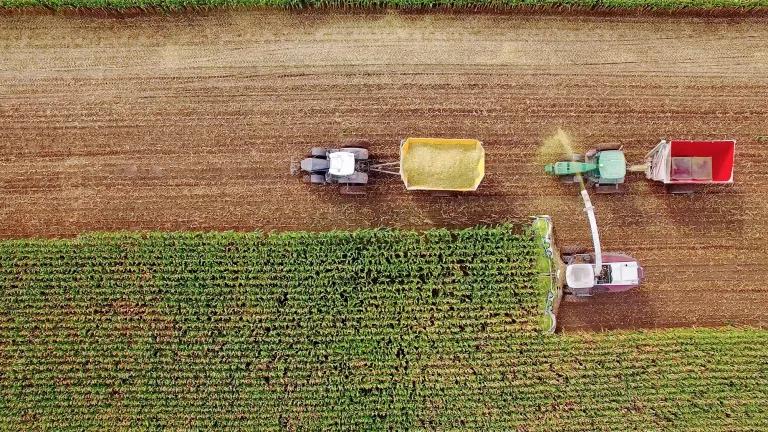General Agriculture Community
Why Is Industrial Farming Considered Unsustainable?
- This topic is empty.
- AuthorPosts
- February 6, 2025 at 10:56 am #554671
 Agric4ProfitsKeymaster
Agric4ProfitsKeymaster
Industrial farming, which focuses on large-scale monoculture crops, heavy use of synthetic inputs, and high mechanization, has significantly increased food production. However, over time, this farming model has raised concerns about its long-term sustainability.
The practices associated with industrial farming have led to numerous environmental, social, and economic issues, making it increasingly viewed as unsustainable.
This article will explore the reasons behind this perception, including environmental degradation, social impacts, economic inequalities, over-reliance on chemical inputs, and loss of biodiversity.
1. Environmental Degradation and Soil Health
Industrial farming practices, such as monoculture cropping, exhaust the soil’s nutrients over time. The focus on growing the same crop in the same field year after year depletes specific nutrients, requiring artificial fertilizers to replenish them.
Over time, this leads to soil degradation, reducing soil fertility and making it less capable of supporting crops without heavy inputs.
Moreover, the extensive tilling and use of machinery compact the soil, reducing its structure and its ability to hold water, which increases erosion and makes the land less productive in the long term.
2. Over-Dependence on Chemical Inputs
One of the defining features of industrial farming is the heavy reliance on synthetic fertilizers, pesticides, and herbicides. While these chemicals boost yields in the short term, they pose significant risks to the environment.
The runoff of chemicals from agricultural fields can contaminate water bodies, leading to eutrophication, which harms aquatic ecosystems.
Additionally, pesticides can harm non-target species, including beneficial insects, and contribute to the development of pesticide-resistant pests.
The long-term over-dependence on chemicals weakens the land’s natural resilience and creates cycles of increasing input dependency.
3. Economic Inequality and Farmer Vulnerability
Industrial farming often requires significant capital investment, such as purchasing expensive machinery, seeds, and chemical inputs.
This creates barriers to entry for small-scale and family farmers, pushing them out of the market or forcing them to adopt unsustainable practices to compete. Additionally, industrial farming is often controlled by large corporations that dominate the supply chain, leaving farmers with little control over prices or decision-making.
This leads to economic inequalities, where small-scale farmers struggle to survive while the profits from industrial farming flow primarily to big agribusinesses.
4. Loss of Biodiversity
Industrial farming typically promotes monoculture, the practice of planting large areas with a single crop species. This reduces genetic diversity and makes crops more vulnerable to pests, diseases, and climate change.
Monoculture farming also negatively impacts the surrounding ecosystem by eliminating natural habitats for wildlife and reducing the availability of food and shelter for beneficial species, such as pollinators.
The extensive use of chemical pesticides and herbicides further exacerbates the loss of biodiversity, as these chemicals kill a wide range of species, including those that help maintain a healthy ecosystem.
5. Climate Change Contribution
Industrial farming is a significant contributor to climate change. The large-scale use of fossil fuels for machinery, irrigation, and transportation increases greenhouse gas emissions. Additionally, livestock farming, especially cattle, produces large amounts of methane, a potent greenhouse gas.
The excessive use of synthetic fertilizers in industrial farming releases nitrous oxide, another potent greenhouse gas.
These emissions contribute to global warming and the associated changes in weather patterns, making agricultural systems less predictable and more vulnerable to extreme events like droughts and floods.
In conclusion, industrial farming is considered unsustainable due to its harmful impacts on the environment, economy, and society.
The depletion of soil health, over-reliance on chemical inputs, economic inequalities, loss of biodiversity, and significant contributions to climate change all highlight the unsustainable nature of this agricultural model.
To create a more sustainable food system, a shift toward farming practices that prioritize ecological balance, soil health, and social equity is essential. Sustainable agriculture offers a promising alternative, focusing on long-term productivity, environmental stewardship, and the well-being of farmers and communities.
Read Also:Cocoyam Marketing in Nigerian Economy: Issues and Challenges
- AuthorPosts
- You must be logged in to reply to this topic.

